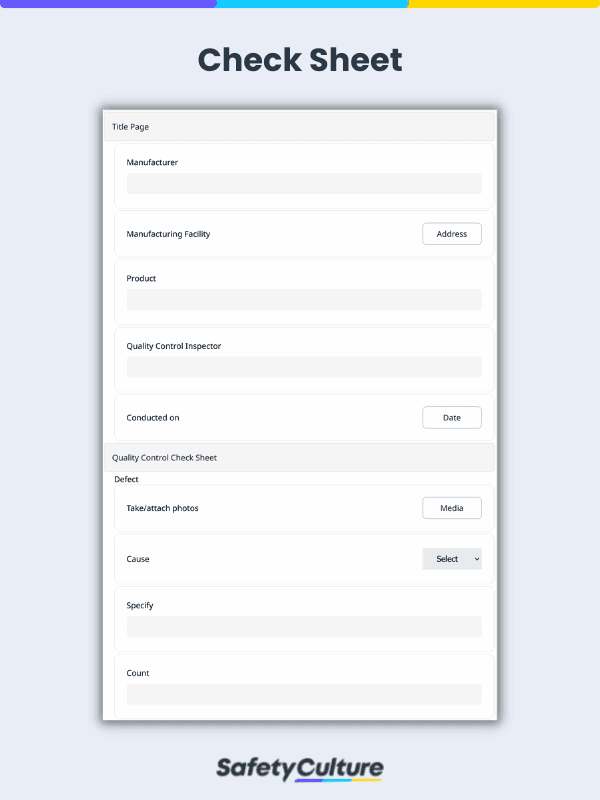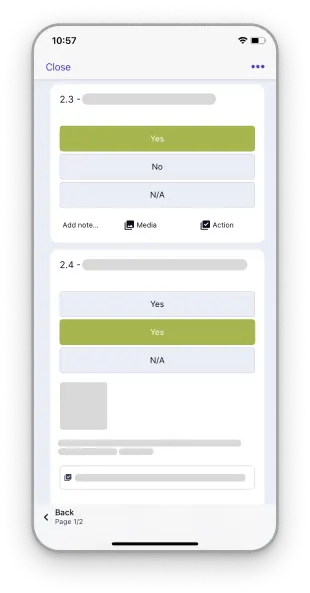What is a Check Sheet?
A check sheet is a pre-made and structured document utilized to collect, organize, and analyze essential data. It is also a quality control tool used in the manufacturing industry to identify defects by type, location, or cause and improve the production process. Check sheets enable frontline workers to capture and compile data in a consistent manner, interpret results, and observe trends over time.
Quality control inspectors should take advantage of mobile-ready check sheets to easily classify product defects, identify the cause of quality issues, and implement effective manufacturing process improvements.
Check Sheet in 7 QC Tools
The check sheet is one of the seven basic tools of quality introduced by Kaoru Ishikawa. The check sheet serves as the key data source for the other quality control tools, which are the fishbone diagram, scatter diagram, histogram, control chart, Pareto chart, and stratification. Its purpose within this framework is to relate the individual pieces of information from the frontline to the bigger picture. For example, the defect-cause check sheet supplements the Pareto chart, which differentiates major causes of failure from minor ones, while the distribution check sheet aids in the creation of the control chart by noting when processes have exceeded specified limits.
When to Use a Check Sheet
Check sheets provide a structure for uniform quality control data collection and a basis for substantiating or refuting quality issues. A check sheet should be used when data can be observed and collected repeatedly by the same person or at the same location, such as a quality control inspector taking note of product packaging defects daily. When collecting data from a production process or about patterns of events, check sheets prove to be the easiest to use while still being effective.
Check Sheet in TQM
Total Quality Management (TQM) focuses on combining the processes, systems, and strategies of an organization with customer-based definitions of quality through strong internal collaboration. A TQM check sheet goes beyond the ordinary function of a check sheet as a defect identification tool. The check sheet in TQM outlines the specific steps to take when a defect has been identified, otherwise known as corrective actions.
By honing in on the solution instead of the problem, these check sheets also adhere to one of the main TQM principles, continual improvement. However, to embody the other main TQM principles such as communications and total employee involvement, a digital check sheet may be necessary since it is interactive and easily shareable.
Elements of a Good Check Sheet
Check sheets should be designed in such a way that it establishes a baseline from which improvement can be considered. To achieve desired outcomes, quality control inspectors should be empowered to create check sheets that encompass these elements:
Customizable
Quality control inspectors should determine how they will classify product defects—by type, location, or cause to accurately indicate how often a specific defect occurred. To validate the effectiveness of a newly made check sheet, conduct a pilot run and apply any necessary changes based on its results. Customizing check sheets with an easy-to-use application can help quality control inspectors save time, which contributes to the overall outcome.
Mobile-ready
Maintaining the quality of tons of newly-manufactured products can be time-consuming, and quality control inspectors unneededly expose themselves to the risk of losing paper-based check sheets. Transforming check sheets into a mobile app enables data collectors to capture photo evidence of product defects, gather digital signatures of persons responsible, and securely save all data in the cloud. Request a demo to begin maximizing digital check sheets and streamline quality control processes.
Instant Reporting
As the starting point for manufacturing process quality improvement, completed quality control check sheets should be immediately reported to the supervisor. Delayed communication of recorded data inevitably slows down continuous improvement efforts, potentially resulting in the recurrence of quality issues. With SafetyCulture (formerly iAuditor), quality control inspectors can automatically generate and share check sheets with members of the organization. Preview sample report.
Real-time Data
Manufacturers can implement effective manufacturing process improvements when they gain visibility of their daily operations. When data collectors complete a check sheet using SafetyCulture, quality control supervisors can access all recorded data in real time with SafetyCulture Analytics. With the click of a button, instantly see the most recurrent type of defect, when and what time the most number of defects occurred, where the check sheet was used, and who used it. Gain reliable results and actionable insights with a premium account.



